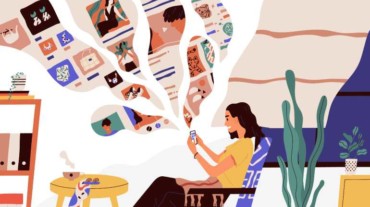
Social media has become an integral part of our lives. This seems like an understatement now! We are glued to our smartphones almost all the time, connected to millions of people around the world. We’ve never consumed content the way we are doing today! It is fast, convenient and gives you all the answers, no doubt.
And you’ll find it especially helpful as a new mother, what with an overload of information on the web about how to take care of your baby, and much more. But, is all this convenience worth it?
The good of social media
Being a new mother, the anonymity of social media helps us connect with other mothers going through the same situation. It’s much easier to unload your problems, and vent it out online. The search engines can also help us navigate other bumps by offering online tutorials. So that definitely deserves a BIG thumbs up!
The bad of social media
Everything has its pros and cons. In this case, too, social media can sometimes not serve you well.
Information overload makes you stressed
To begin with, you experience the stress of knowing too much. Online tutorials, how-to videos and articles can help you a great deal, but can also be counter-productive, as it can make you hyper aware. And sometimes, Google pops up with some of the scariest diagnoses!
The web also stores fake information, and remember that spreads like wildfire. So, sometimes you don’t really know the authenticity of the content.
Disturbed sleep cycle
A new mother barely gets any sleep, especially in the first few months. The blue light emitted from the phone mimics daylight, and confuses our brain into assuming that night hasn’t set in. The hormones responsible for slowing down our body are not released the way they should, and then you keep scrolling post after post on social media, without even realising!

You will be anyway awake for long hours at night when you breastfeed your baby, and social media is the easiest distraction and tool to keep you company. Be wary of this trap.
This is how you can counter it
The ugly side of social media
Select Topics of your interest and let us customize your feed.
PERSONALISE NOWSocial media is addictive
This has been proven in many studies, and recently shown in detail in the Netflix documentary The Social Dilemma. The validation that you get after getting likes and comments on your baby’s pic that you posted on Facebook is comparable to the effect drugs have on your brain. And just like a drug, your body will crave this “validation high” over and over again.
In some cases, it can also lead to the mother having low self-worth, and other mental health issues. More and more new mothers compare themselves to other influencers and their perfect bodies, and feel self-conscious. A negative body image can lead to consuming less food and trying to embark on a weight loss journey too soon. This can lead to poor physical recovery and even depression (if adequate nutrition is not taken in the first 3 months after delivery)
Also, wtach:
Social media can also make you fat
The light from your phone mimics daylight, and instructs your body to produce less melatonin, This hormone melatonin is responsible for making us feel energetic during the day, and drowsy as night sets in. Going online when your baby is keeping you awake at night messes up with your body clock. In addition, such a messed-up body clock produces less of the satiety hormone leptin. This hormone helps you feel satisfied after eating a meal, and helps to reduce your appetite.
Over many days, as your leptin keeps waning because of night time exposure to light, your appetite goes out of whack, and so does your waistline.
How to counter it:
So mommies, take care of your health and use social media in moderation. It will go a long way in improving your sleep patterns!